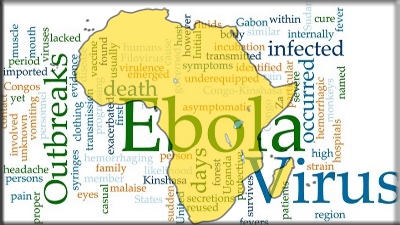Ebola has been called Ebola viral disease and/or Ebola hemorrhagic fever. Regardless of the name, Ebola is an extremely rare disease that causes death a large percentage of the time once contracted by an individual. Ebola is a product of one of the different strains of the Ebola. This viral agent is regarded as a prototype pathogen of viral hemorrhagic fever, with high fatality rates in humans and primates. The natural reservoir of Ebola virus remains unknown, although bats seem to be the most likely reservoir. The incubation period seems to be the same in animals as for humans, but scientists are unsure about this because some animals do not show symptoms even when they test positive for the Ebola virus.

How Long Is Ebola Incubation Period?
Ebola virus incubation period
An incubation period is the time between being infected with a virus and the appearance of symptoms caused by that virus or disease. In the case of Ebola, incubation was normally thought to be between five and ten days. During this recent outbreak, however, the World Health Organization (WHO) stated that, “Recent studies conducted in West Africa have demonstrated that 95% of confirmed cases have an incubation period in the range of 2 to 21 days.”
Is a person contagious during the incubation period?
A person is not contagious during the incubation time frame. After symptoms start, the patient will remain contagious for more than three weeks.
Symptoms of Ebola
Early symptoms of Ebola
● Sudden fever
● Muscle pain
● Headache
● Sore throat
Later symptoms include:
● Intense weakness
● Vomiting
● Diarrhea
● Rash
● Impaired kidney function
● Impaired liver function
● Internal bleeding
● External bleeding
Important Notes
Transmission of Ebola is possible via direct contact with the victim's bodily fluid, that's why it's important to take measures to prevent ebola virus.
A man is still infectious for up to 3 months even if he's cured because the Ebola virus can live in his semen. So it is advised to refrain from sex during that time period.
Course of Action When Experiencing Ebola Symptoms
Laboratory tests at the medical providers will reveal low white cell counts, low platelet counts and elevated liver enzymes.
People suspected of having the disease must immediately be reported to the local health department. In order for them to survive, prompt medical attention is essential. If they receive essential care, their likelihood of survival vastly improves. Controlling the spread is also vitally important. Infection control procedures, such as those recommended by the Centers for Disease Control (CDC) must commence immediately.
Should a person have travelled to a locale known to have an Ebola outbreak, or have come into contact with a known or suspected Ebola victim and s/he starts to feel symptomatic, medical attention must be sought at once.
Diagnosis of Ebola Viral Disease
Other viral infections mimic Ebola in the early stages: malaria, meningitis, typhoid fever; it even bears some similarities to influenza. Because viruses can look alike when they first manifest themselves, a blood test is utilized to confirm a diagnosis. The types of blood tests used to establish that a patient is indeed infected with Ebola are listed below:
● antibody-capture enzyme-linked immunosorbent assay (ELISA)
● antigen-capture detection tests
● serum neutralization test
● reverse transcriptase polymerase chain reaction (RT-PCR) assay
● electron microscopy
● virus isolation by cell culture
Don’t worry if you have had some of these tests in the past; they are used for things other than Ebola! Collecting samples must be conducted under the maximum bio-containment conditions because doing so poses an extreme risk to the healthcare worker who is taking it. Samples from patients infected with Ebola are extremely bio hazardous.
Call for Increase of Quarantine Period Based on Ebola Incubation Period
More than half of all Americans of voting age would currently support restricting entrance into the United States to those persons travelling from countries facing Ebola outbreaks and they have a spokesperson in Democratic Representative Tulsi Gabbard of Hawaii. Friday she held a press conference where she lobbied for “immediate suspension of visas for citizens of Ebola-stricken West African nations.”
The World Health Organization, based on new scientific studies, supports a forty-two day quarantine period. Therefore, Gabbard encouraged the CDC to increase the quarantine period from twenty-one to forty-two days, as those recent studies have shown that’s how long the virus can incubate. If this were to happen, it might have implications for those currently under quarantine because of the three cases in Dallas.

View All Comments /Add Comment